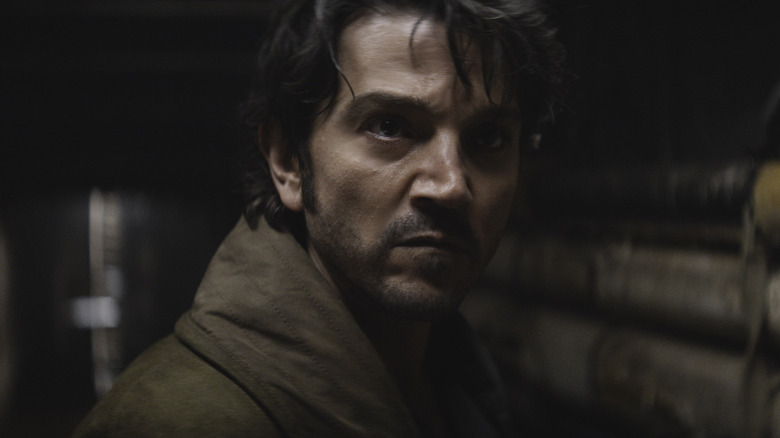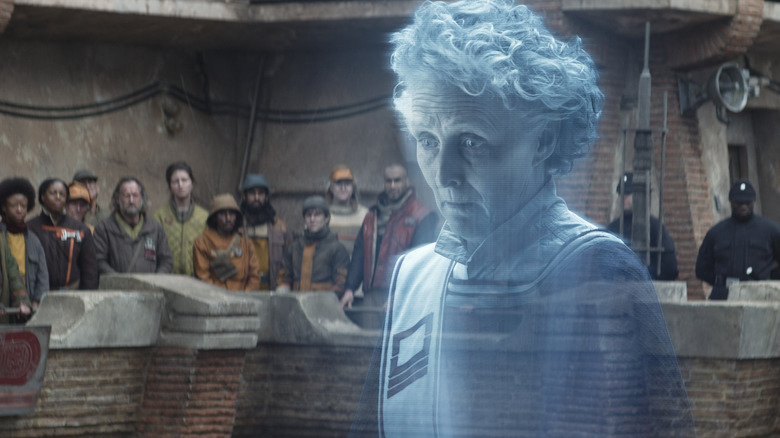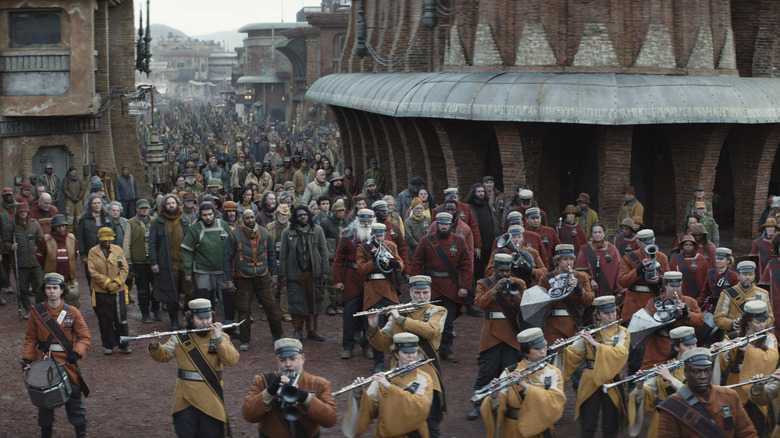The Andor Season 1 Finale Shows The Importance Of Both The Individual And Their Community
This post contains spoilers for the season finale of "Andor."
The "Star Wars" movies tend to be all about individuals and leaders. Jedi masters, army commanders, team leaders, loners who come in at the last minute to save the day, and solo heroes who take down empires while the rest help silently in the background. More often than not, this franchise has been a power fantasy about a select few having special destinies.
"Andor" is not like that. This Disney+ series is the best thing "Star Wars" has ever produced, a show that fulfills the promise of Lucas' world, and shows the possibilities of the galaxy, far, far away in telling a wide variety of stories. As a political thriller, the show is full of poignant commentary. As a prequel, it provides context and improves on what came before, showing an Empire that is truly scary and evil, so oppressive that rebellion becomes a necessity. As for the rebels, the show gives them depth and layers we hadn't seen before, showing us the inner struggles that drive people to rise up and fight.
More than anything, "Andor" is challenging the idea of what a "Star Wars" hero is. There are individuals who are making a difference, but they are not the messianic type who stand in front of a crowd and lead a charge, instead the type who leads others to rise up and do the work. More than any other "Star Wars" title, "Andor" is a true ensemble piece that places no singular character above the others, but explores how their collective heroism impacts others to follow and rally not behind, but alongside them.
All for one and all for one
"Andor" is finding a different way of showing it than we're used to in a title like this. Take Cassian Andor himself — he is not the typical "Star Wars" hero. He does not lead openly or by example and he is not a great person, but he is great at rallying others to rise up and push forward, like on Narkina 5. In the finale, we see the effect Nemik had on Cassian, as we see him listening to Nemik's manifesto — and later committing to be a full-time rebel. Then you have Maarva, a character who didn't have to do open rebellion to initiate a revolution. Instead, her kindness in life and her spectacular speeches in death spark the light that light the fires that burn down entire empires little by little.
The three are integral in the formation and eventual success of the Rebellion, but they are not like Luke Skywalker. They inspire others to rise up, but they don't lead from the front. Instead, they become the unsung heroes who, like Nemik says in his manifesto, "push our lines forward" without the guarantee or the desire to be remembered by the movement. The first season of "Andor" explored the idea of the Empire falling because they are so obsessed with maintaining power they don't expect anyone to fight them, and the finale takes that idea a step further. In what may very well be one of the best "Star Wars" scenes ever, we see how Maarva's funeral procession becomes a communal show of force and a musical revolution like in "Les Misérables." This catches the Empire by surprise, sparking a chaotic fight without a clear winner. It's unlikely the Empire was beaten out of Ferrix, but this is a moment they won't soon forget.
Rebellions are built on hope
The reason the revolt works is that the Empire was fully prepared for, and expecting, an individual and not a crowd. All throughout the season, we've seen how desperate the Imperial Security Bureau (ISB) is to find messianic individuals they see as the big threats to the Empire. They looked into rebel leader Anto Kreegyr, Cassian Andor, and his possible link to a network of rebels, as well as the enigmatic Axis. Even "Obi-Wan Kenobi" had Vader and his goons obsessed with finding not the network of rebels that helped refugees, but with finding Obi-Wan.
During Maarva's funeral, the Empire was prepared to find and capture Andor. The soldiers positioned across the town were mostly there for show, their weapons out in the open to intimidate, and the stormtroopers not doing much other than scare people. They were not targeting a riot, because they never imagined it could happen — their only concern was Cassian Andor, the individual. This is how an entire battalion of stormtroopers are taken out by a crate full of grenades exploding, because they didn't even bother locking them up, and they were not paying attention to the harmless kid in the crown hiding a bomb. It is also how Dedra Meero is finally beaten because she is expecting Andor to rise from the crowd and challenge her to a one-on-one duel, or Luthen to come out and say he's Axis, and face her straight-on. She never even considered the possibility of a faceless revolutionary hitting her from the side with a rock amidst the chaos.
"Andor" is challenging a lot of notions of what "Star Wars" can be, of who matters, and whose stories should be told. The show is presenting individuals not as divine heroes, but as members of a community to rise up and lift everyone up with them to push a movement forward.


